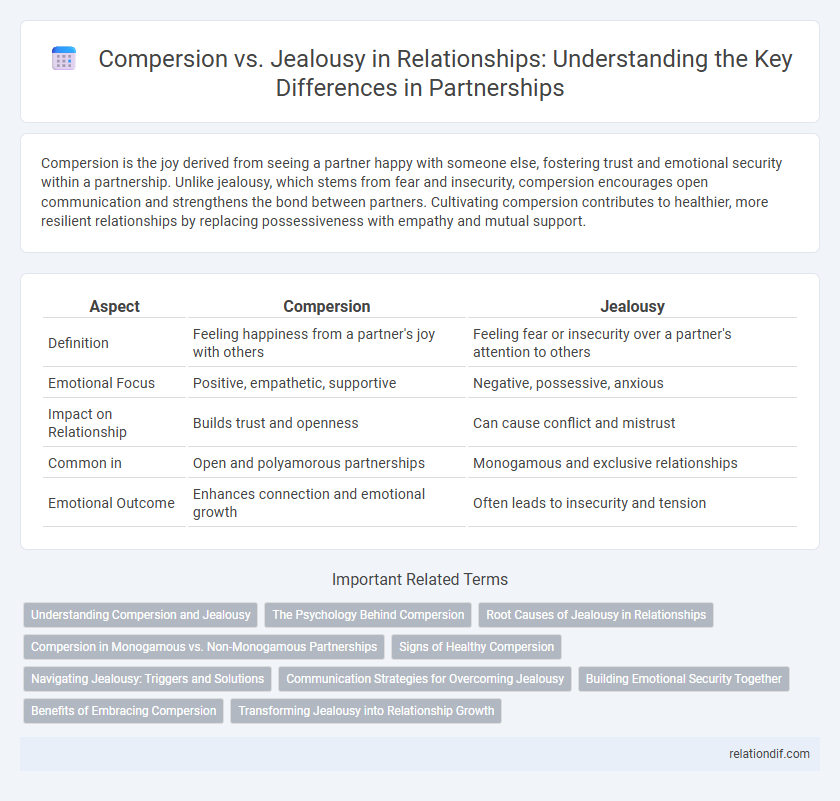Compersion is the joy derived from seeing a partner happy with someone else, fostering trust and emotional security within a partnership. Unlike jealousy, which stems from fear and insecurity, compersion encourages open communication and strengthens the bond between partners. Cultivating compersion contributes to healthier, more resilient relationships by replacing possessiveness with empathy and mutual support.
Table of Comparison
| Aspect | Compersion | Jealousy |
|---|---|---|
| Definition | Feeling happiness from a partner's joy with others | Feeling fear or insecurity over a partner's attention to others |
| Emotional Focus | Positive, empathetic, supportive | Negative, possessive, anxious |
| Impact on Relationship | Builds trust and openness | Can cause conflict and mistrust |
| Common in | Open and polyamorous partnerships | Monogamous and exclusive relationships |
| Emotional Outcome | Enhances connection and emotional growth | Often leads to insecurity and tension |
Understanding Compersion and Jealousy
Compersion is the positive emotional response experienced when witnessing a partner's happiness with others, emphasizing empathy and shared joy, whereas jealousy involves feelings of insecurity, fear, and possessiveness regarding a partner's attention or affection. Understanding compersion requires recognizing it as an empathetic joy that strengthens relational bonds, contrasting sharply with jealousy's threat-driven and protective nature. Cultivating awareness of these distinct emotional reactions enhances communication and emotional resilience within partnerships.
The Psychology Behind Compersion
Compersion is rooted in positive psychology, characterized by genuine happiness for a partner's joy and connections outside the primary relationship, contrasting jealousy which often stems from fear and insecurity. Neuroscientific studies indicate that compersion activates brain regions associated with reward and empathy, promoting emotional resilience and trust. Understanding this psychology helps cultivate healthier, more open partnerships by fostering mutual support and reducing possessiveness.
Root Causes of Jealousy in Relationships
Jealousy in relationships often stems from fears of abandonment, insecurity, and low self-esteem, which contrast with compersion--a feeling of joy in a partner's happiness with others. Root causes include perceived threats to emotional connection and trust, frequently triggered by past experiences of betrayal or neglect. Addressing these underlying issues through open communication and emotional reassurance strengthens partnership dynamics and fosters compersion.
Compersion in Monogamous vs. Non-Monogamous Partnerships
Compersion, the feeling of joy from a partner's happiness with others, differs significantly between monogamous and non-monogamous partnerships. In non-monogamous relationships, compersion is often actively cultivated as a positive emotional experience, promoting openness and trust. In contrast, monogamous relationships typically emphasize exclusivity, where compersion may be less common or challenging to experience due to societal norms prioritizing emotional and sexual exclusivity.
Signs of Healthy Compersion
Healthy compersion manifests as genuine happiness for a partner's joy and experiences, reflecting emotional maturity and secure attachment in a partnership. It includes open communication, mutual support, and the absence of possessiveness or insecurity. Recognizable signs are empathetic listening, celebrating successes together, and fostering trust that strengthens relationship bonds.
Navigating Jealousy: Triggers and Solutions
Navigating jealousy in partnerships requires identifying common triggers such as insecurity, lack of communication, or perceived threats to emotional connection. Effective solutions involve open dialogue, fostering trust through reassurance, and practicing compersion--the genuine joy in a partner's happiness with others--to transform jealousy into growth. Establishing boundaries and emotional transparency supports healthier, more resilient relationships.
Communication Strategies for Overcoming Jealousy
Effective communication strategies for overcoming jealousy in partnerships include practicing active listening, expressing emotions honestly without blame, and setting clear boundaries together. Using "I" statements helps partners articulate feelings without triggering defensiveness, fostering mutual understanding and trust. Consistent open dialogue reduces misunderstandings and strengthens emotional resilience, transforming compersion into a shared experience of joy for each other's happiness.
Building Emotional Security Together
Compersion fosters emotional security by encouraging partners to celebrate each other's happiness, reducing feelings of jealousy and insecurity. Prioritizing open communication and trust cultivates a safe environment where emotional needs are met collectively. Developing empathy through shared experiences strengthens the partnership and supports mutual emotional growth.
Benefits of Embracing Compersion
Embracing compersion fosters deeper emotional connections and enhances trust within partnerships by celebrating a partner's happiness outside the relationship. This positive emotional response reduces feelings of insecurity and jealousy, promoting mental well-being and emotional resilience. Couples practicing compersion often experience improved communication and greater relationship satisfaction, strengthening long-term bonds.
Transforming Jealousy into Relationship Growth
Transforming jealousy into relationship growth requires recognizing compersion as an empowering emotional response where one finds joy in their partner's happiness with others. Practicing compersion fosters trust and open communication, reducing insecurity and promoting emotional resilience within partnerships. Embracing this shift encourages mutual support and strengthens the bond, turning jealousy into a catalyst for deeper connection and personal development.
Compersion vs Jealousy Infographic

 relationdif.com
relationdif.com